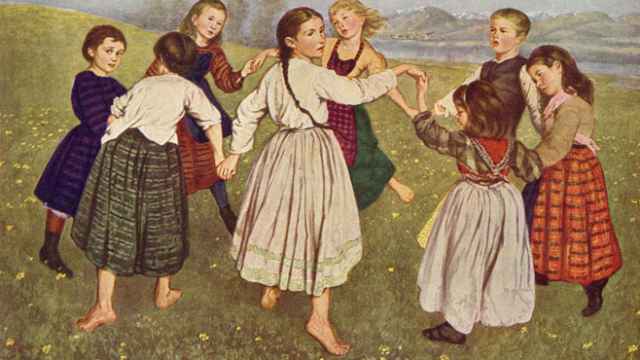Тёлка: Heifer, young woman
A few weeks ago a philosophical-linguistic-moral-generational argument began when one online publication used the word тёлочка (diminutive form of heifer; slang for a young woman) in a tweet. Then someone in another online publication wrote a scathing article about sexism, as evidenced by the word тёлочка, followed by a third publication that asked a variety of hip young and not-so-young women their opinion of the word тёлочка, and then linguists joined in — and the discussion went on and on. The entire evolution and differences of opinion about language, sexism and feminism in Russia today can be gleaned by following a couple of links.
It all started with this: Мужики, тут инструкция, как не обижать тёлочек. (Guys, here are instructions on how to avoid insulting chicks) — a phrase that seemed to do exactly what it purported to avoid. Was the term demeaning or not? The linguists consulted were appropriately wishy-washy, since nothing in a language is ever cut-and-dried. One said it depended on context: Всё зависит от женщины и от той ситуации, в которой это слово произносят. (It all depends on the woman and the situation in which the word is said.) Another linguist seemed to want it both ways: Обращение "тёлочка" действительно оскорбительное, хотя и уменьшительно-ласкательное. (Addressing someone as "little heifer" is in fact insulting, although the term is an affectionate diminutive.)
But who cares about linguists? What did actual young cows — er, women, have to say?
Some made a distinction between forms of the word. Когда поняла, что не "тёлки," а "тёлочки" — это совсем другое дело. Даже приятно! (When I realized the word wasn't "heifers" but the diminutive form, it was totally different. It's even nice!)
For other women, тёлка and тёлочка are mostly derogatory: Тёлка — малознакомая баба (тупая, за 30), тёлочка — молодая секси чика. (A heifer is some woman you don't know — dumb, over 30 — but a sweet little heifer is a young sexy chick.) Я сама называю других женщин "тёлочками," когда речь идет о малознакомых или незнакомых мне девушках, которые мне малоинтересны. (I call other women heifers when I don't know them or barely know them, and when they don't interest me.)
But almost all the women polled and who contributed online comments didn't have any problem with the word in the right context: Тёлочка — страшно нежное и ласковое (The word is awfully tender and affectionate.) And they were critical of women who objected to being compared to a large, mooing ruminant: Те, кто видят в слове "тёлочки" угрозу личной свободе или какое-то эфемерное неуважение, обладают просто чугунной серьёзностью. (People who see some threat to their personal freedom or some kind of ephemeral lack of respect in the word are as serious as iron.) In English this is called being strident.
Some male commentators agreed that it depended on context, but when they called their loved one тёлочка it was a sign of great affection. But according to several men, the word тёлочка is, like, so last century. Now the word is the very indecent шкура (pelt): Я свою шкурой называю, вроде не обижается. (I call mine "pelt" and she doesn't seem to mind.) However, other guys seem to have a different understanding of the word: Нормальные девушки в клубы не ходят, там только шкуры. (Nice girls don't go to clubs. Only skanks go there.)
User beware: When talking to your sweetie, avoid all terms connected with animal husbandry and hunting.
Michele A. Berdy, a Moscow-based translator and interpreter, is author of "The Russian Word's Worth" (Glas), a collection of her columns.
A Message from The Moscow Times:
Dear readers,
We are facing unprecedented challenges. Russia's Prosecutor General's Office has designated The Moscow Times as an "undesirable" organization, criminalizing our work and putting our staff at risk of prosecution. This follows our earlier unjust labeling as a "foreign agent."
These actions are direct attempts to silence independent journalism in Russia. The authorities claim our work "discredits the decisions of the Russian leadership." We see things differently: we strive to provide accurate, unbiased reporting on Russia.
We, the journalists of The Moscow Times, refuse to be silenced. But to continue our work, we need your help.
Your support, no matter how small, makes a world of difference. If you can, please support us monthly starting from just $2. It's quick to set up, and every contribution makes a significant impact.
By supporting The Moscow Times, you're defending open, independent journalism in the face of repression. Thank you for standing with us.
Remind me later.








